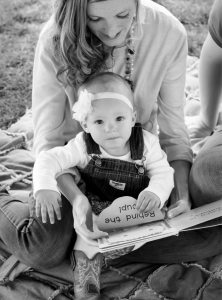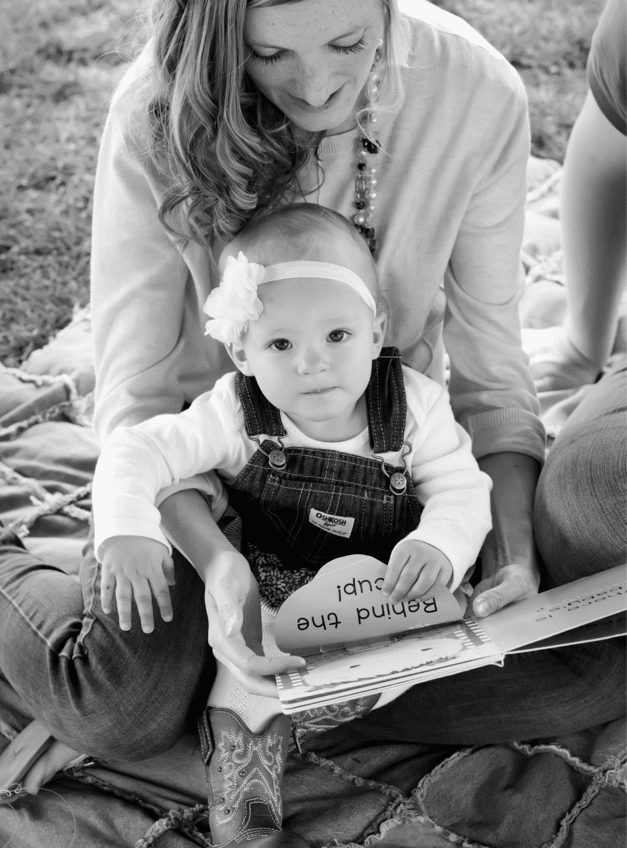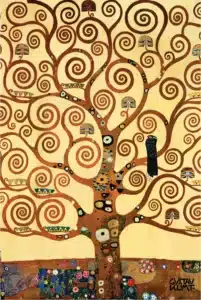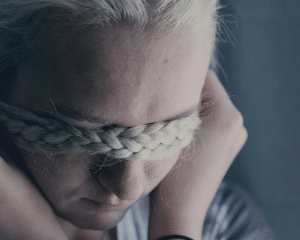
By Aly H
I felt it again early this morning as my toddler slept, her growing little sister prodding me from the inside as I opened my worn, forest green quad to find yet another enthusiastic “Follow the Prophet!” in one of the margins, put there by a younger, less complicated version of myself.
I felt it last fast and testimony meeting as a member testified that Joseph Smith was, except for Christ, “as perfect a man as ever lived”—this the same week that my daughter had beggggged me all week to just take her to “nooshwee” already, where her sweet leaders have already taught her about following the Prophet.
And I felt it again near the beginning of this month, as some others did, as I heard President Nelson describe the collective wrestling before God, the compassion and awareness and faith that, he explained, led to confirmations of the Spirit and, subsequently, those policy changes.
I’m not sure how to describe the tension I feel in these moments—the complicated pain I’ve come to know so well the last few years in some critical interactions with my Mormon faith. I guess it’s a combination of feeling sick, and sad, and troubled and off kilter. And abandoned, in a way. Sometimes I feel angry, and sometimes I just feel angry at myself–at whatever personal badness must have muddied what was once so pure and simple for me… added such complexity to what was once unquestioning peace and testimony.
My reaction to this tension, too often, is to just shut down. That’s what I felt like doing when I heard President Nelson talk about the policy, but this time I stayed put: through his assurance that we all have the ability to know for ourselves the mind and the will of Heaven; through that Harold B. Lee quote that sort of makes sense but mostly just makes me uncomfortable; and then through his lovely concluding story about a time when following the Prophet—in this case, being willing to study the Mandarin language—blessed his life again and again in amazing, unexpected ways.
It was the Mandarin story that finally helped me sort through some of the tension I’ve been feeling.
First, because it reminded me of those formative years when I, again and again, gained a testimony of following the Prophet.
It began for me in college: on beautiful Cache Valley runs with my huge iPod turned to the latest General Conference addresses; on cold mornings on my apartment floor, a talk I’d printed off at the Merrill-Cazier the night before and my forest green quad sprawled out before me.
Inspiration and promise and a connection with God came to and flowed through me during times like these.
And again and again, what prophetic word gave me was the patience and courage to follow after the better angels of my nature… to be willing to hear God within me. As I listened, I started to better understand what sin and pride and numbness feel like, and what charity and grace feel like, and of how to sift through my intents with greater honesty and to deliberately, faithfully act on what is best within me. This was God working in me–quietly acquainting me with greater truth and goodness and beauty, helping me construct a more grown-up, personal sense of morality.
All that building up is sacred to me, especially now.
And so much of it began with following the Prophet.
So what happens when it seems that you must choose? When the choice is to follow a Prophet you’ve felt is called of God, or to be true to the moral compass you watched that same God place within you? What are we to do when what once felt synonymous now abruptly, confusingly seems to have split into two distinct paths? Which voice does one privilege?
As I listened a couple of weeks ago, I eventually had to conclude that a story, however lovely, about heeding a Prophet’s counsel when faced with two morally neutral choices doesn’t address those questions for me.
But as I’ve thought all of this over, I’ve wondered if another story might… the story of Eve.
The version I’m thinking of is the beautiful account Mormonism offers me, the one I choose to see and internalize, the one I want to tell my daughters over and over.
It matters very little to me whether or not this story actually happened, because either way, it is one of the truest stories I’ve ever heard; one that points me to a God who is familiar, who deeply understands and privileges true learning and all that it necessarily, perfectly entails; a God with the power and compassion to turn falls into beautiful Ascents.
Here is what I hope my daughters eventually learn from humanity’s brave first mother:
1) To listen: to hear me and their dad and each other and latter-day Prophets and to hear the voice of God within them. To listen to the lives and perspectives of others: people who love and respect them, people who feel differently than they do, people who might be hard to love and understand, people who are thoughtful and seeking and good. To pay attention to the tension within and around them.
2) To be willing to struggle: to think and to feel and to expand; to be vulnerable enough, still enough, humble enough, compassionate enough to wrestle with competing goods and complex moral questions and the everyday push and pull of the messages they will hear and the motives and intents within themselves.
and 3) To be courageous: to trust that their souls were made good and to act, true to the divinity within them. Even when doing so feels hard and lonely and complicated and uncertain.
Be brave, my girls. Follow always after the True, the Good and the Beautiful.
A Wyoming girl living in the Seattle area with her husband and their tornado toddler daughter. Aly loves teaching, writing, running in rainy/cloudy/gorgeous western Washington and eating gluten-free cinnamon rolls that someone else made.






16 Responses
Thanks, Aly, for your thoughtful, loving post that articulates so clearly the turmoil that some of us are wrestling with. It is comforting to be reminded that Eve also wrestled with the dilemma of following divine directives or her own moral self. She made her choice and all of us are grateful to her. You have given us a ray of hope.
Aly,
Beautiful post. I particularly like your articulation of the problem here. “So what happens when it seems that you must choose? When the choice is to follow a Prophet you’ve felt is called of God, or to be true to the moral compass you watched that same God place within you?”
Personally, I opt for my own moral compass. But I understand how painful and lonely it can be to make that choice. You’re right that Eve is a wonderful model for us in using our own intuition to guide us to the better path.
Definitely. My perception (and maybe this is too optimistic?) is that if you could convince them to go there, most Mormon moms would give the same answer… Especially if it was their kids coming to them with those questions. To answer otherwise would be to ignore/subvert the same moral reasoning that ought to have led us to a life of faith in the first place.
I love your take on Eve, Aly. I think the Church does such a good job of teaching #1. Maybe we, as a community, could do a little better job of #2 and #3?
Yes! James 1:22 seems to encourage that very thing. We deceive ourselves, rob ourselves of precious opportunities to learn of God, when we think #1 is the end game.
This is gorgeous, Aly. I’ve often felt the same way – that the church and its simple narratives provided the scaffolding I needed to develop a relationship with God, but that my relationship with God now seems to be at odd with the scaffolding at times. It’s messier, and it’s more painful, but I also think it’s better, because I’m able to develop a relationship with God that’s not only following, but wrestling and growing. We have more paradoxes in our church and theology than we’re often comfortable admitting, and I love your three tools for navigating those. Thank you for your post – I hope you’ll post again!
Thanks, Liz. I’m so with you–that working through the messy, painful parts aquaints us with beauty and meaning and Grace in ways that would be unavailable to us if we were unwilling to eventually step out of a paradise of easy obedience. I don’t know that everyone is asked to go there. But I think more and more of us are/will be, and I hope I can at least prepare my kids to struggle thoughtfully/honestly with the moral dilemmas they’ll be faced with.
It’s not a clear-cut path when the source of discomfort is tied up with what has previously been a source of comfort and inspiration. You’re not alone.
I love the hope for your daughters “to trust that their souls were made good and to act, true to the divinity within them. Even when doing so feels hard and lonely and complicated and uncertain.”
Thank you for your thoughtful post Aly. I love your beautiful take on Eve’s story. I especially love this: “It matters very little to me whether or not this story actually happened, because either way, it is one of the truest stories I’ve ever heard; one that points me to a God who is familiar, who deeply understands and privileges true learning and all that it necessarily, perfectly entails; a God with the power and compassion to turn falls into beautiful Ascents.”
Thank you, Ali. All that building up is sacred to me, too. And sometimes, in my frustration, I forget.
Thank you for this, Ali. I agree with you in so many ways. It doesn’t matter if any of the stories in the scriptures really happened, I love that there is a God- make, female or whatever power that there is– who understands, and loves. Thank you for this lovely reminder.
Thank you so much for writing this. I could have written this myself, I so strongly identify with your thoughts. I love you. Thank you for sharing your struggle.
What a beautiful rendering of the Eve story; a great example of likening the scriptures unto ourselves.
I’m not sure I’ve ever seen someone use that story like this… we seem to envision this divine “catch-22” as a unique “one of”, and not as something we may all face. An “Eve-ean trial”, so to speak.
I used to struggle hard with the temple for a variety of reasons, and one thing that has helped immensely is that the story of Eve bravely wrestling with a morally complex decision is such a central part of the temple session. Especially profound when we as women are asked at the beginning to not just sit back and watch but to imagine that we ARE Eve, in a sense. In that way, Eve’s willingness to struggle and be true to her love of God and mankind and her sense of right and wrong seems prescriptive…. And like you said, not just for women, but for all of us. It’s not a clear-cut story of easy, thoughtless obedience told in the temple but one that I think encourages us to be thinking and courageous. The God I worship would absolutely want a story like that in the temple, and it gives me hope that it’s in there.
So well written!
The Great Challenge of Milenials is: How to transition from the Harsh LDS Church of our Parents to The Tollerant Church of our Children. It will not be easy.
Thank you for this post. I especially love when you got to the example of our mother Eve, because I was thinking of her so much before, when you hinted at two paths calling us. I also think what you described at the beginning, is so normal, with the things you marked and wrote in your scriptures, and the place you’re at now. I believe in mature faith, and see it in you.